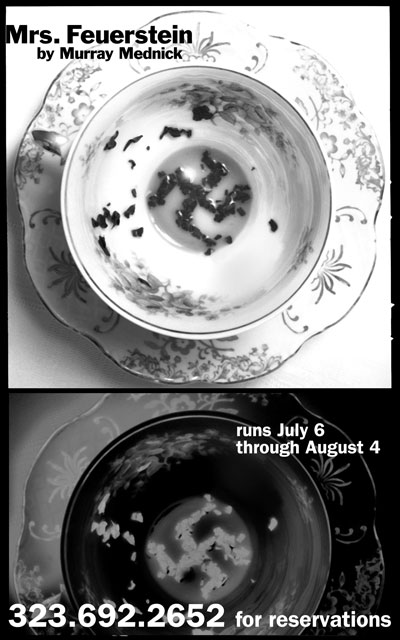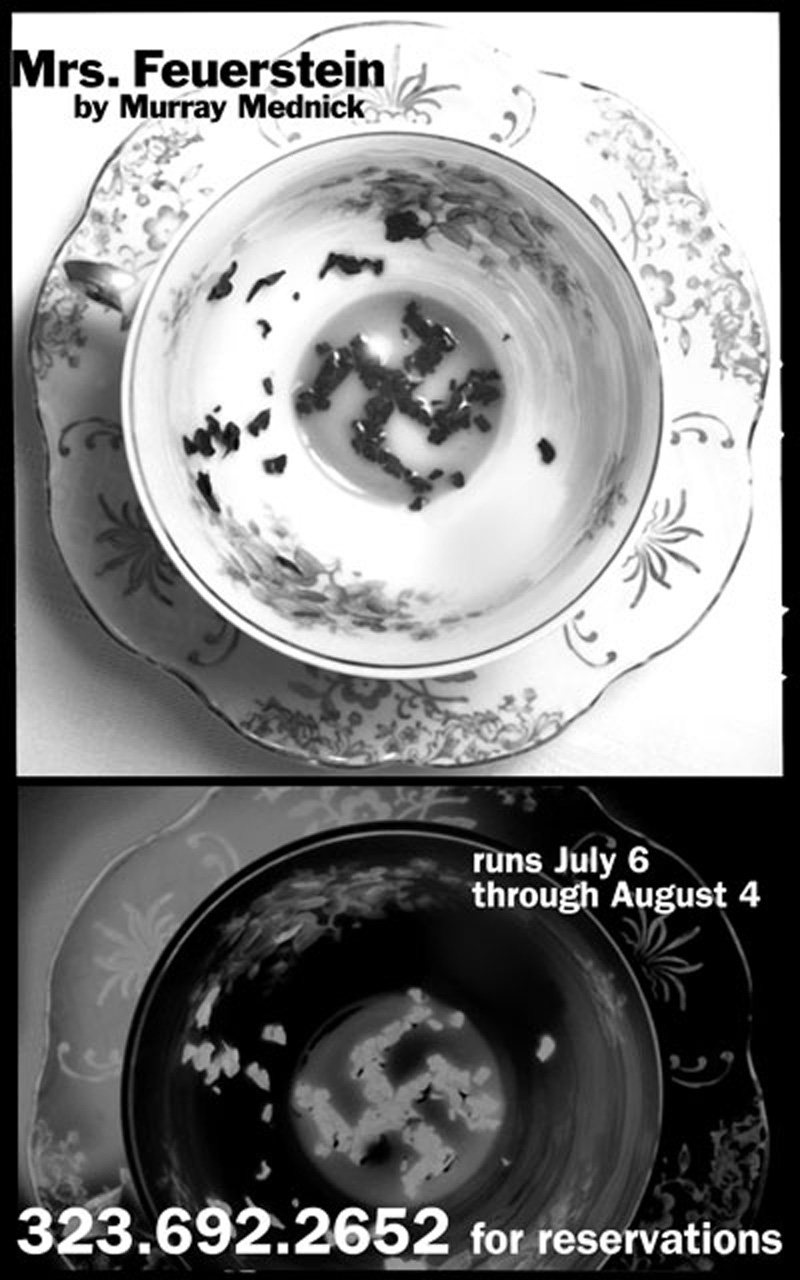
Mrs. Feuerstein
Written by Murray Mednick, directed by Roxanne Rogers
Set in the 1960’s, Mrs. Feuerstein, a creative writing teacher at a private school, confronts the painful legacy of the Holocaust. Vulnerable and on the verge of a psychotic break, she becomes obsessed with the idea of revenge, and writes a play where she imagines herself in an unusual relationship with a German couple. Ideas of revenge and expiation manifest into an unusual sexual attraction, as the underdog seeks the role of tormentor and the oppressor seeks forgiveness. Mrs. Feuerstein is a beautiful story about a vulnerable woman dealing with her past.
Mednick was inspired by a (description) photograph of a glamorous German couple he came across in the book “Hitler’s Willing Executioners.” The photo (image) of Frieda Wohl eating finger sandwiches and sipping champagne while watching her husband Max, a member of an SS execution squad stationed in Poland, butcher 50 Jewish men in a town square, set Mednick thinking about the notion of revenge. “I set out to explore, who do you take revenge on, especially now? Who do you kill?”
“I’m trying to deal with the incomprehensibilty of the Holocaust, the difficulty of assimilating the truth,” he said in a Los Angeles Times interview. “The whole idea of history doesn’t mean anything if such a thing can happen.” “It’s an allegory of the eros of revenge and expiation,” Mednick explains. “Frieda longs for expiation, and Mrs. Feuerstein longs for revenge. When the two meet, it’s like an erotic thing. They are drawn to one another.”
Mrs. Feuerstein was first presented at 2100 Square Feet Theatre, Los Angeles, Ca., on July 28th, 2001. It was directed by Roxanne Rogers with set by Jeffrey Atherton, lights by Rand Ryan, costumes by Bridget Phillips, original music and sound design by O-Lan Jones, and the following cast:
ADELE FEUERSTEIN Maria O’Brien MAX WOHL Christopher Allport FREIDA WOHL Lynnda Ferguson DR. SAMUELSON Louis R. Plante DR. BAUM Drago Sumonja JANE Gwendolyn Yeo
NOTES ON THE PLAY
I recall hearing fragments of Mrs. Feuerstein during a master class Murray conducted in his home in 1996, when he would read (as we all did) from his work-in-progress. Today I hear echoes of that time throughout the play. Living in West LA, Murray was teaching part time at ShelHevet, a modern Orthodox Jewish high school. He and his wife Christina had just returned from China with Celene, the beautiful baby girl they had adopted there. The Padua Festival the previous summer had been held on the well-watered lawns of USC. Despite memorable productions, the thunder of football pads and the constant din of helicopters and sirens, had rendered the Padua spirit even more fugitive than usual. Few of us expected more festivals in the future. Over the ten weeks of his workshop, it became clear that Murray was looking back over a long and celebrated career and asking again: “Why write plays?” For answers, we interrogated the usual suspects: Aeschylus, Shakespeare, Ibsen and Beckett. I suspect Hamlet was among the plays we read – its themes of revenge and doubt appear throughout Mrs. Feuerstein.
Also that year Murray read Daniel Goldhagen’s controversial “Hitler’s Willing Executioners,” which threw a harsh new light on the vicious anti-Semitism of ordinary Germans, and their complicity in Nazi crimes. I’ve heard Murray speak of the impact on him when, at age five, he saw the first newsreels out of a defeated Germany – nightmarish images of emaciated men and women shivering beside piles of dead bodies. Murray says he felt an immediate connection to these Jews, and recognized instantly that this horrific event concerned him intimately. Decades later, the Goldhagen book transformed the fear of this recognition into an anger so fierce that it demanded to be actualized in the form of revenge.
And yet, of course, for a Jew the idea of revenge is problematic – even if one could somehow equal the depravity, abject cruelty and sheer scope of the Nazi horror, what about the need to be just? What about the absolute prohibition against murder? In Murray’s view, the opposing demands of revenge and justice must be reconciled on a higher level, namely, on the level of text. It’s easy to miss the magnitude of this idea. For a playwright, text may look and sound a lot like real life, after all. And through Mrs. Feuerstein’s elaborate play-within-a-play structure, Murray has erased the line between audience and text even further. Remember too that from the beginning, the Jews have been a literary people…a people of the text.
Always active in Murray’s work is the notion that the truly big ideas can only be “thought” via theatre. In Mrs Feuerstein, the big idea concerns how the German atrocities forever diminished our ability to mean something. Through the haunted character of Adele Feuerstein, Murray urges us to truly confront this loss, and not from a place of safety or remove. Armored by her anger, we go deeper…to view not a blurred, softened picture, but the actual truth in all its awful specificity. What was done can never be un-done, the play says. What was lost will never return, and this knowledge must be endured. But at the same time Retribution will be taken – Adele Feuerstein is coming from the Jews.
Guy Zimmerman – Artistic Director
